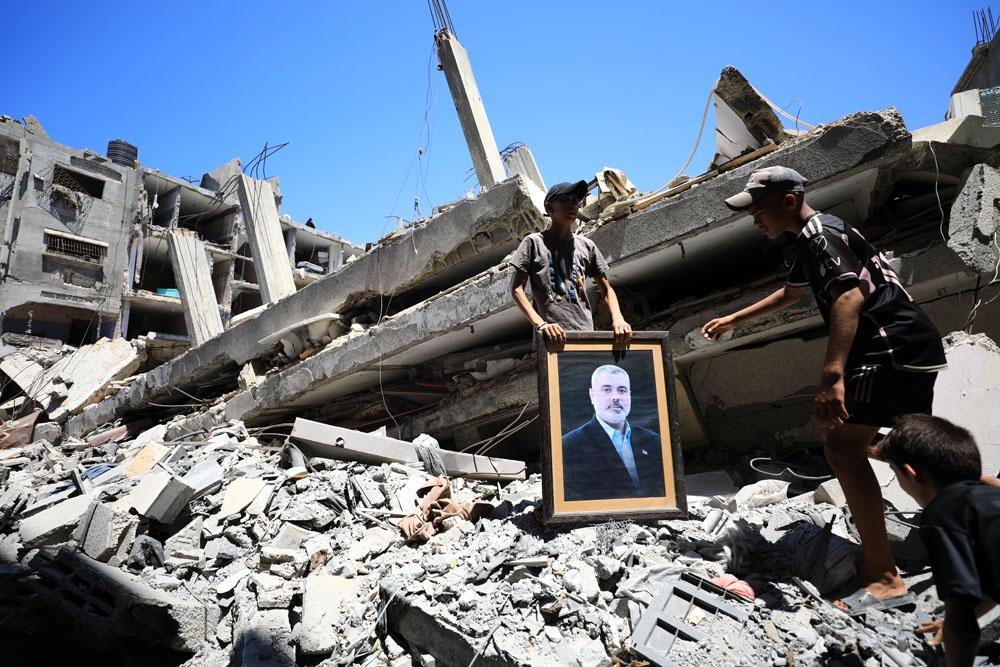How Israel's attacks could redefine Middle East dynamics The fragile balance
Recently, Israel has carried out a series of eliminations targeting the leadership of its military adversaries, significantly altering the situation in the Middle East.
The leader of the Palestinian Hamas movement, Ismail Haniyeh, was killed in Tehran on July 31. The following day, the leadership of the Israel Defence Forces (IDF) and the Shin Bet intelligence agency officially confirmed the elimination of Hamas's top military commander, Mohammed Deif, during an attack on an underground bunker in the Palestinian city of Khan Younis (Gaza Strip) about three weeks ago.
The military and political leadership of the organization operate independently from each other, coordinating their efforts but making autonomous decisions. Therefore, this could indicate the removal of the heads of both branches of Hamas. This could potentially lead to some disorganization within the group. However, Hamas has not officially confirmed Deif's death, so it is uncertain whether he is indeed dead.
However, there is no doubt about the results of another Israeli attack that took place just before Haniyeh's assassination. In Dahieh, a predominantly Shia Muslim suburb in the south of Beirut that is the heart of the Lebanese pro-Iranian group Hezbollah, the chief of staff and second-in-command of the organization, Fuad Shukr, was killed in a missile strike.
If we add to this the systematic eliminations of military leaders of key Hezbollah units by the Israeli Air Force, it becomes clear that Israel is methodically targeting the leadership of forces conducting military operations against it, aiming for their disorganization. The assassination of Haniyeh alone wouldn't lead to such disorganization, but a series of eliminations is a step in that direction.

Hezbollah, which controls Lebanon, Hamas, which still maintains positions in the Gaza Strip, Bashar al-Assad and various militias in Syria, militias and political parties holding key positions in the Iraqi government, and the Houthis—fighters controlling a third of Yemen—all form parts of what is known as the "Axis of Resistance."
This is a military-political bloc through which Iran has established its sphere of influence from Tehran to Beirut, including Baghdad and Damascus. The "Axis of Resistance" conducts military actions against Israel, launching attacks from Gaza, Lebanon, and Yemen, and targeting US military bases in the region. Israel responds by bombing Gaza and southern Lebanon.
Both sides have somewhat calibrated their actions, with Hezbollah limiting its shelling of Israel to 10-15 kilometers within its territory, and Israel responding similarly. However, the situation is now changing.
Firstly, Israel is actively dismantling the command structures of its opponents, which is becoming a crucial factor in the conflict.
Secondly, Haniyeh's assassination has exposed the vulnerabilities in Iran's security systems to an unprecedented extent. As a high-profile guest and leader of an organization at war with powerful forces, Hamas' leader should have been heavily protected. The fact that he could be killed by a precision missile in the Iranian capital would make Iranian leaders feel unsafe. This is undoubtedly a significant leverage point for Israel, demonstrating to its opponents just how insecure they are, which might make some of them more inclined to negotiate.
Thirdly, Israeli Prime Minister Benjamin Netanyahu has managed to present these attacks as his personal success to his society. After the October 7 raid into Israeli territory, during which Hamas militants killed 300 soldiers and 900 Israeli civilians and took 240 people hostage, Netanyahu promised to eliminate Hamas leaders and dismantle the group's entire military structure. Today, he can claim that the first part of this mission has been accomplished.
Three high-profile attacks on the leadership of their adversaries may somewhat bolster the shaky position of Prime Minister Benjamin Netanyahu within a country dissatisfied with the progress of military operations in Gaza. The Israel Defence Forces (IDF) have so far been unable to eliminate Hamas in Gaza. With top military leaders in Israel deeming further operations in the Gaza Strip futile, citing shortages of ammunition, spare parts, and declining morale among soldiers—as reported in an interview with The New York Times—it is crucial for Israel's political leadership to strengthen its image.
Fourthly, Netanyahu might have been hoping for a massive response from Iran and Hezbollah, which would prompt the US to intervene in the conflict on Israel's side. Together, they could then crush their enemies. However, this scenario seems unlikely.

Iran has no interest in a major war at this time. The reasons are clear: ongoing social protests and strikes, the vulnerability of the country's economy, and its missile and nuclear industries. Moreover, Tehran would not want to risk Hezbollah, which serves as its main deterrent against Israeli bombings—an asset it has armed for decades.
Therefore, it is highly likely that Iran and Hezbollah's response will be moderate, similar to their reaction when Israel bombed the Iranian consulate in Syria in April. At that time, Iran launched about 300 rockets and drones at Israeli territory. The US intervened then to prevent a massive Israeli counterattack on Iran, thereby stopping the escalation. Today, the US will likely take all necessary steps to de-escalate the conflict, using promises and threats alike, addressing both Iran and Israel.
With elections just a few months away, a major war in the Middle East, one that Israel—a strategic ally of America—would fight against its adversaries, is something the Washington administration absolutely does not want, as it could draw the US into the conflict.
Moreover, a full-scale Middle Eastern war between Israel and the "Axis of Resistance" would, according to economists, lead to a sharp rise in fuel prices, a global economic recession, and higher gasoline prices in the US. This would be the worst-case scenario for the ruling Democratic administration in the US. They will do everything possible to prevent both sides from taking extreme measures.
Therefore, the likelihood of transitioning to a full-scale and prolonged war seems less probable. However, such a scenario cannot be entirely ruled out.
The views and opinions expressed by guest columnists in their op-eds may differ from and do not necessarily reflect the views of the editorial staff.








